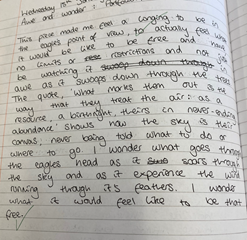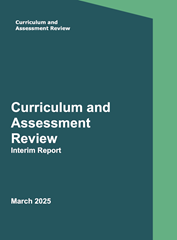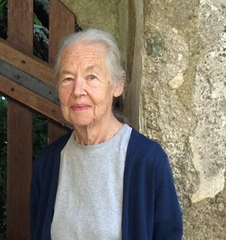‘So is Paradise Lost a pastoral text?’, the don asked, lowering her glasses and raising her voice across an absurdly long table. It was my first interview at Pembroke College, Cambridge, and I was in at the deep end. I hadn’t even mentioned Milton in my personal statement – he’d just cropped up in conversation and the interviewer pressed. I cobbled an answer. Perhaps it was just the caffeine high, but I didn’t panic, because the question was straight out of emagazine.
Well, almost. The year before, I had written an article for the magazine entitled ‘From Wessex to West Egg: The Great Gatsby as Pastoral’ (September 2013, Issue 62). At the time, it was simply an opportunity to explore some ideas I’d had while daydreaming in class, and test them in a respected national journal. As far as uni applications went, being published might lend interest to my personal statement. At best, I hoped it might provide a script for the interview:
Interviewer: Is The Great Gatsby a pastoral text?
Ed: It’s funny you should ask…
Of course, it was never going to be that simple. But what I hadn’t appreciated at the time, is that my experience of writing for and reading emagazine had prepared me for the interview.
Learning to Read
Fitzgerald’s Jazz Age novella and Milton’s Biblical epic are very different texts, but although Gatsby is not exactly Satan (Discuss), I had been trained in a way of thinking about literature that allowed me to respond confidently and thoughtfully. Too often in lessons it can feel that time is taken up explaining ‘what’s going on’, putting aside the bigger questions of ‘how the text achieves those effects’ and ‘how it relates to the bigger picture’. emagazine offers that attention, in tightly focused articles that draw out a specific theme or device, as in ‘Elusive and Treacherous – An Exploration of Time in Daphne du Maurier’s Rebecca’ (April 2016, Issue 72), or magnify the influence of particular contexts, as in ‘Mrs Dalloway – Class, Gender and Mental Illness’ (September 2013, Issue 61). emagazine taught me that the experience of reading a literary text is elaborately and ambiguously constructed through artistic choices. It also taught me that texts do not exist in a vacuum, but respond to their environment. Literature is richly interconnected and we should be bold in making connections – as I tried to be in arguing for the distinctly urban Gatsby being Pastoral.
In my second interview, I was asked to pick two texts, one from the twentieth century, and the other from the nineteenth. I went for Conrad’s The Secret Agent and Stevenson’s The Strange Case of Dr Jekyll and Mr Hyde. The interviewer, cocked his head, nodded, and said: ‘compare them’. Of course, the exercise wasn’t itself valuable – academics don’t just throw darts at bookshelves to find work. The point was to find out how I thought, and here I was aided by a particular strength of emagazine: comparative criticism. Writers often use particular texts as reference points or case studies, with which to discuss feature of style or genre, as in ‘Robert Frost and the American Gothic’ (September 2013, Issue 62), which compares Frost with Shakespeare, Poe and Dante. This article, and others like it, showed me how one text can be used to illuminate another. In short, the magazine made me into a better critic. Both in my interviews and undergraduate career, the open-mindedness and ambition it fostered has proved invaluable.
Learning to Write
It was invaluable not least in generating topics for my dissertations and coursework – long essays you usually write as part of an English degree at Cambridge. These involve close discussions with a supervisor about proposals and redrafts before the essays are finally submitted. It can be a long and frustrating process, but my first dissertation felt strangely familiar. Emailing off my proposals, a sense of déjà vu hit from two years ago when I had emailed the editors of emagazine with a similar list of suggestions. Déjà vu gave way to a welcome familiarity, as the supervisor bashed my essay into shape, just as the editor helped me to mould my article. Indeed, the technical skills of researching and referencing I acquired through redrafting the Gatsby piece took the sting out of the dissertation process. I therefore have emagazine to thank for helping me become not only a more imaginative critic, but also a more rigorous one.
Learning to Talk
The topic of my dissertation – eye contact in the novels of DH Lawrence – might not look out of place in the pages of emagazine. Of course, the styles of essays and articles are very different – one being compact and formal, the other light and accessible. The magazine is written to be easily understood, without compromising its academic integrity. This principle prepared me for ‘supervisions’ – the core of English at Cambridge. These are regular sessions in which you discuss the week’s reading in small groups, led by a Fellow. At best, supervisions are the bookworm’s dream – a chance to debate with like-minded people all the material you’ve hungrily consumed and have your mind blown by the casual brilliance of the supervisor. But sometimes you feel tired, stressed, or a little intimidated. Here, emagazine has been most useful to me. It gave me the confidence to trust that I could be understood if I spoke simply, that the worth of a point lay in its substance, not its syllables, and that if I couldn’t understand someone, I wasn’t necessarily being stupid – it was their job to explain their point. This confidence is crucial to getting the most out of supervisions, which depend on effective discussion among students on varying amounts of sleep. There’s a more fundamental point here. We do need academic prose – we need precise tools for fiddly intellectual work – but if we can’t just chat about great literature then something’s gone very wrong.
In my school library, emagazine sat on a carousel in the corner. It did better than the physics one, but was less popular than Xbox Magazine. It deserves pride of place. emagazine offers a platform for original thought, thorough research and compelling argument. I would recommend it to readers looking for a challenge or material to bolster coursework, to the curious and the bored, and to those applying for English or any essay subject. Whatever your reason to engage with literature at an advanced level, you could do worse than read and (perhaps) write for emagazine.
Subscribe to emagazine
To download a sample issue of the magazine, to find out more and to subscribe, click here.




